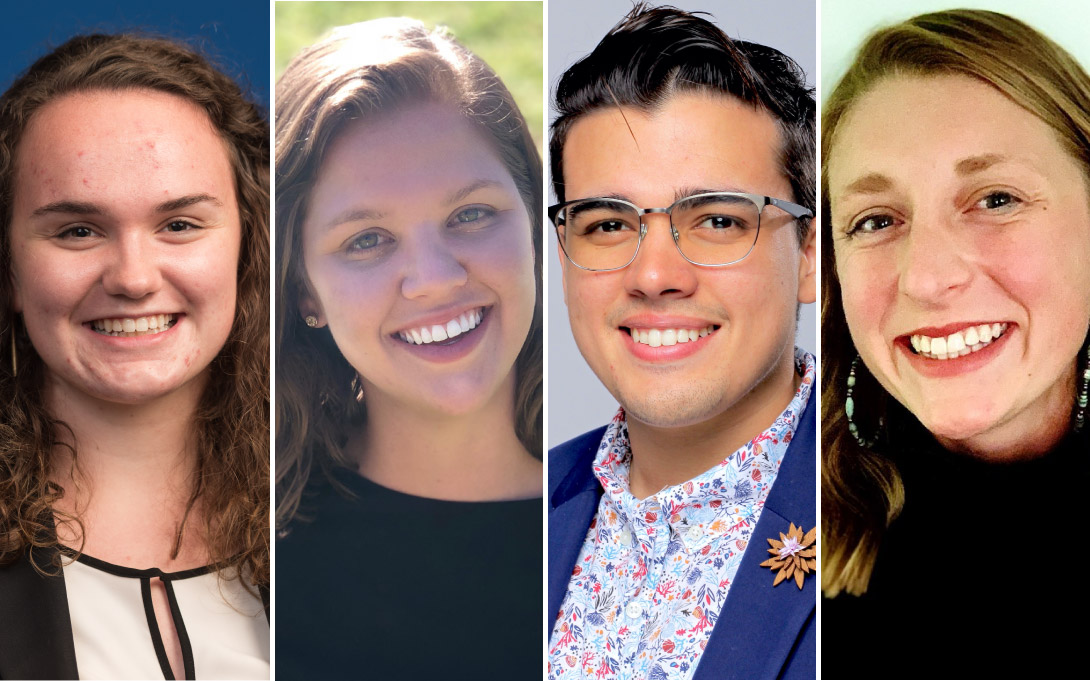
Four Ford School students will spend the next year working to make Michigan water resources cleaner and more accessible, helping Great Lakes Bay region businesses dedicate to sustainable practices, and promoting environmentally-sensitive tourism in Costa Rica. Kristina Curtiss (MPP ‘22), Tyler Orcutt, (MPP, MS ‘23), Anna Seifert (MPP ‘22) and Javier Piñeiro (MPP ‘22) have been selected as Dow Sustainability Fellows, and will be pursuing their projects in teams with students from across the University—from the law school, Ross School of Business, School for Environment and Sustainability (SEAS), medical school, College of Engineering, School of Public Health and Taubman College of Architecture and Urban Planning.
The Dow Sustainability Fellows Program was established in 2013, supported by the Dow Company and the Dow Company Foundation, to create year-long partnerships with external organizations to develop “actionable, high-impact solutions for the clients they serve. Dow Fellows partner with businesses, non-profit organizations, and communities—all in an effort to advance sustainable practices.” The program recently received funding to continue through 2023.
Orcutt and Curtiss are on a team that will be working with the State of Michigan Department of Environment, Great Lakes, and Energy (EGLE), focusing on water resources.
It's frustrating that we have the greatest amount of access to [fresh water] out of anywhere in the world, and yet have issues with quality, access, affordability and equity.
Kristina Curtiss (MPP ‘22)
“It's frustrating that we have the greatest amount of access to this resource out of anywhere in the world, and yet have issues with quality, access, affordability and equity,” says Curtiss.
As a policy and SEAS dual degree student, Orcutt is determined to keep contributing to the community in a meaningful way. “So with the Dow, that opportunity is to actually help local organizations and communities around Michigan implement climate goals,” she says.
Their team includes a medical student, a water systems engineer and an urban planner.
For Orcutt, “Having a medical student on the team is a really big value add, because water has so many implications on public health. As far as dissemination and communication of water policies, that's a part that really can speak to communities. In my experience with public policy, community buy-in is really difficult, especially if you're talking about lower income communities who have a lot of mistrust for big government programs.”
Curtiss says they will try to focus on equity. “I'm really excited about the project and the fact that we get to work with the state agency definitely provides us with a lot of room to make a change. Michigan has obviously had issues with water, even before Flint. Look at Detroit and water shut-offs and water affordability. Those are the most pressing issues,” she says.
The Dow program currently centers on two critical challenges: addressing climate protection and embracing a circular economy—the model of production and consumption which involves sharing, reusing, repairing, refurbishing and recycling existing materials and products as long as possible.
Seifert’s work touches on the challenge of the circular economy, in conjunction with the Great Lakes Bay Region Alliance, a four-county collaboration formed to create a strong economy on the shores of Saginaw Bay. They have a new emphasis on the environment, encouraging businesses to make a sustainability pledge, which Seifert and her team will address.
“Our challenge is: how do we create this pledge, create this system, in a way that can be applied to a lot of different businesses and is achievable, but also does have real environmental impact? This isn't their organization's total goal, since they work on a lot of other regional business development issues. It's nice to see that they're identifying sustainability and environmental issues as a priority,” she says.
With team members from SEAS, Ross and Taubman, Seifert says the project reflects what she wants to do when she graduates. “I don't know exactly what that would look like, but somehow I want to bridge the divide between the policies we create and how businesses are run for more sustainable solutions.”
In partnership with the U-M Ginsberg Center, Dow Fellows also learn about ethical engagement—including valuing community expertise, respecting the spectrum of social identities, and recognizing potential bias.
That is the center of Piñeiro’s team project in Costa Rica, the only international project in this year’s cohort. He has worked on sustainability projects in rural areas in his native Puerto Rico.
In Costa Rica, a small coffee-producing community wants to expand upon its existing hotel and education center to create a sustainable natural park. Palmichal, about an hour outside of the capital San Jose, hopes for expanded economic opportunity while conserving the stability of the ecosystem at the same time.
The main focus is advancing participatory policy, so this project can be inclusive of the members of the community who already reside there.
Javier Piñeiro (MPP ‘22)
“The main focus is advancing participatory policy, so this project can be inclusive of the members of the community who already reside there. We want to be very intentional and respectful about the approach that we make to the community, which is needs based and also culturally informed,” he says.
It is all relevant to his future plans. “Approaching sustainable development, especially the economic side, is something that I would like to dedicate myself to. I love working with communities, working with people is really important to me. I hope that I can find a role that allows me to work with people on the ground.”
The students all receive a stipend for their research work. The teams will present their final project reports in December 2021.